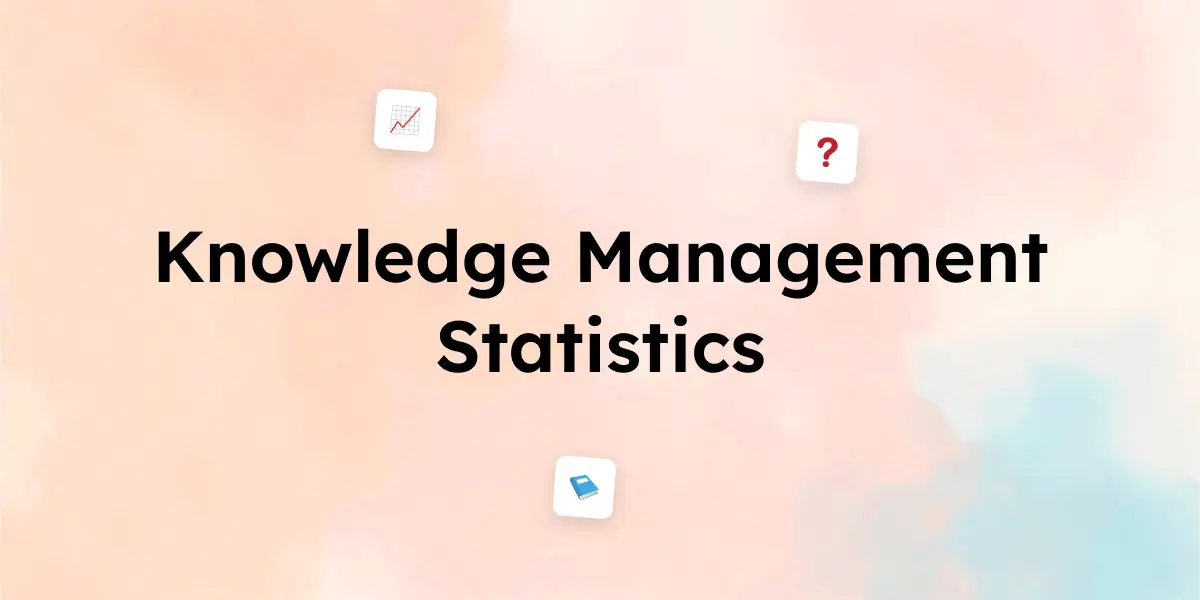In 2025, knowledge management (KM) is no longer just a corporate function—it’s a competitive necessity. Organizations that effectively capture, store, and distribute knowledge see higher productivity, faster decision-making, and better customer experiences.
With AI-driven automation, remote work challenges, and rising data volumes, the demand for efficient KM systems is at an all-time high. Companies that fail to implement modern KM strategies risk knowledge loss, operational inefficiencies, and declining business performance.
This blog presents 35 essential statistics on the latest trends, challenges, and technologies shaping knowledge management in 2025. Whether you’re a KM professional, business leader, or IT strategist, these insights will help you optimize your knowledge-sharing strategies and stay ahead in the digital era.
35 Knowledge Management Statistics
1. The Growing Importance of Knowledge Management
- 74% of organizations say effective KM improves productivity by at least 20%.
- The global KM market is expected to grow at a CAGR of 18.6%, reaching $2.2 billion by 2028.
- 60% of employees say they spend too much time searching for information, costing companies an average of $47 million annually in lost productivity.
- 80% of Fortune 500 companies now have formal KM programs in place.
- Companies that actively manage knowledge are 4.5x more likely to be industry leaders.
2. Knowledge Retention & Employee Productivity
- 42% of company knowledge is lost when an employee leaves.
- Employees spend an average of 2.5 hours per day searching for information, leading to a 30% loss in productivity.
- Organizations that use AI-powered KM systems see a 35% faster knowledge retrieval rate.
- Only 39% of companies have formal knowledge retention strategies for departing employees.
- 52% of employees say they don’t share knowledge because there’s no easy way to do it.
3. AI & Automation in Knowledge Management
- 85% of KM teams believe AI and automation will revolutionize knowledge management in the next five years.
- Companies using AI-powered chatbots for knowledge retrieval report a 40% reduction in support ticket resolution time.
- 75% of enterprises will have AI-driven knowledge management systems by 2027.
- AI-enhanced knowledge bases can reduce information retrieval time by 60%.
- Organizations using AI-powered document management report 2x faster decision-making.
4. Remote Work & Collaboration Trends
- 68% of remote workers struggle with accessing company knowledge, leading to reduced efficiency.
- Companies with centralized KM platforms see a 25% improvement in collaboration among remote teams.
- 72% of employees say having a searchable internal knowledge base improves their job performance.
- 56% of organizations say remote work has made knowledge management more critical than ever.
- Companies with effective KM for remote teams report a 30% reduction in onboarding time for new hires.
5. Customer Support & Knowledge Management
- 67% of customers prefer self-service knowledge bases over speaking with a support agent.
- Companies with well-structured knowledge bases see a 25% reduction in customer service costs.
- 91% of customers say they would use an online knowledge base if it met their needs.
- 58% of organizations report a direct link between customer satisfaction and knowledge management quality.
- Companies with AI-driven customer knowledge bases see an 80% increase in first-contact resolution rates.
6. ROI & Business Impact of Knowledge Management
- Companies with strong KM systems experience 30% higher revenue growth rates than those without.
- Implementing an effective KM system can lead to a 20-25% reduction in operational costs.
- Organizations with a culture of knowledge sharing outperform competitors by 50% in long-term sustainability.
- 80% of employees say better KM practices would improve innovation within their organization.
- Businesses investing in knowledge automation see a 3x return on investment (ROI) within two years.
7. Knowledge Management Challenges in 2025
- 55% of organizations cite “knowledge silos” as their biggest KM challenge.
- Only 37% of companies have a formal KM strategy in place.
- 50% of organizations struggle with outdated knowledge that leads to incorrect decision-making.
- 65% of employees say they have missed deadlines or made poor decisions due to lack of accessible knowledge.
- 42% of knowledge workers say their company lacks a system for tracking and updating internal knowledge.
8. Future Trends in Knowledge Management
- 70% of businesses will invest in AI-powered knowledge assistants by 2026.
- 85% of knowledge workers believe that personalized knowledge recommendations will become standard in KM systems.
- By 2027, 90% of KM platforms will integrate generative AI for real-time knowledge curation.
- 45% of businesses plan to adopt blockchain for knowledge security and verification by 2028.
- The demand for KM professionals will increase by 30% by 2030 as knowledge becomes a strategic asset.
Conclusion
Knowledge management is evolving rapidly, driven by AI, automation, and the shift to remote work and digital-first collaboration. These 50 statistics highlight why investing in AI-driven knowledge systems, centralized platforms, and knowledge-sharing cultures is crucial for staying competitive in 2025.
💡 Next Steps: If your organization wants to improve knowledge-sharing and productivity, consider:
✅ AI-powered knowledge management platforms
✅ Automated knowledge retrieval and chatbots
✅ Centralized knowledge-sharing strategies
What KM trends are you seeing in your organization? Let’s discuss in the comments! 🚀
FAQs on Knowledge Management
1. What is knowledge management, and why is it important?
Knowledge management (KM) refers to the process of capturing, organizing, storing, and sharing information within an organization. It ensures employees have quick access to relevant knowledge, improving decision-making, productivity, and collaboration. In 2025, AI-powered KM systems are becoming a game-changer, reducing search time and increasing efficiency.
2. How does AI impact knowledge management?
AI automates knowledge retrieval, organizes information, and provides intelligent recommendations. AI-powered chatbots, machine learning algorithms, and natural language processing (NLP) make it easier for employees to find and use knowledge quickly, reducing knowledge silos and improving workflow efficiency.
3. What are the biggest challenges in knowledge management today?
Some key KM challenges in 2025 include:
Knowledge silos – Information is scattered across multiple tools and departments.
Lack of adoption – Employees often resist using KM platforms.
Outdated information – 50% of organizations struggle with maintaining accurate, up-to-date knowledge.
Employee turnover – 42% of company knowledge is lost when employees leave.
4. What are the benefits of an AI-powered knowledge management system?
Organizations using AI-powered KM report:
✅ 35% faster knowledge retrieval
✅ 40% reduction in customer service response time
✅ 25% lower operational costs
✅ Increased collaboration in remote teams
Sources for Knowledge Management Statistics :
McKinsey & Company
Gartner
Deloitte
Harvard Business Review (HBR)
Forrester Research



